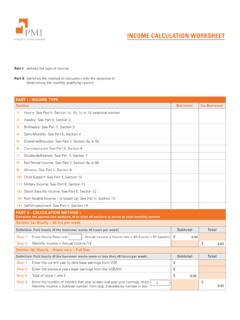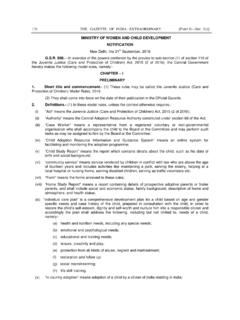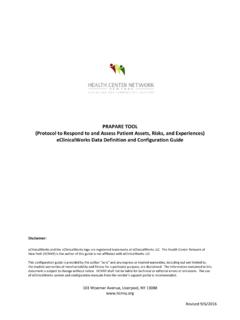Transcription of Directors of Children’s Services, Department for Education ...
1 1 Version June 2018 Professional Capabilities Framework for social Work in England Guidance on using the 2018 refreshed PCF Introduction and how to use this document The Professional Capabilities Framework (PCF) is the profession-owned backbone of social work Education and professional development in England. First devised in 2012, the PCF has been reviewed and refreshed through a process of extensive consultation during 2017 and 2018. This has been led by BASW in conjunction with Research in Practice. The review has preserved the best of the PCF and elements that consultation respondents considered to be most important and useful, while modernising, clarifying and developing key aspect. A detailed overview of the refresh process is available on the BASW website. This process was overseen by a multiagency steering group including Skills for Care, Shaping Our Lives, Local Government Association, Principal social Worker Networks adults and children, Association of Directors of Adults social Services, Association of Directors of Children s Services, Department for Education and Chief social Worker for Children and Families, Department for Health and social Care and Chief social Worker for Adults, social Workers Union, Joint Universities Council for social Work Education Committee, Association of Professors of social Work, BASW Policy, Practice and Education Groups.
2 The changes and additions described below in this document should now be adopted by all. These changes are an evolution from what has gone before and while some changes to existing learning or workforce development materials will be needed, the refresh has been designed to be straightforward and non-disruptive to existing learning or workforce materials. One of the key changes you will notice is the move to use of the collective third person we in the domain descriptors. This emphasises the personal commitment and connection practitioners need to achieve the capabilities and show our professionalism. There is also a theme of increasing reference to service user and carers views and expertise through the PCF. Where possible, text has been kept the same, reduced in length (although this has not been possible in all sections) and turned into plain English In this document you will find the following sections: 1. Alignment between PCF 2018 and KSS in the BASW/DHSC/DfE joint statement 2.
3 A definition of the PCF 2018 3. A refreshed explanation of capabilities 4. The PCF 2018 graphic 5. An explanation of the three new super domains Purpose, Practice, Impact 6. The nine refreshed domain descriptors 7. The nine refreshed level descriptors 2 Version June 2018 The detailed level descriptors for each domain are available in a separate document. These have been reviewed but wherever possible have been kept substantially the same as previously and have just been brought into alignment with the refreshed domain descriptors. Where the term PCF is used below, this means exclusively the recently refreshed PCF 2018 unless otherwise stated. See the separate document PCF 2018 Domain Level Descriptors for detailed guidance on capabilities in each domain at every level. 1. Alignment of the PCF 2018 with the Knowledge and Skills Statements (KSS) for Adults and Children The PCF is not a curriculum content guide for all social work development and was not created to be such.
4 Rather, it is the framework of generic capabilities and professional development onto which specific areas of practice knowledge and skill can be built ( capabilities for social work with older people). The need to align with the KSS has been raised throughout the refresh process. We have agreed a joint statement with the Department for Health and social Care and the Chief social Worker for Adults, and the Department for Education and Chief social Worker for Children. This aims to simply state how the KSS map on to the Practice domains of the PCF. In relation to the KSS, a joint statement between DHSC, DfE and BASW was issued on 2nd March 2018. This clarifies that The KSS set out what a social worker should know, and be able to do, in specific practice settings, in specific roles and at different levels of seniority. The KSS map onto the Practice domains of the PCF (Knowledge, Critical Reflection and Analysis, Interventions and Skills) and should help guide everyday practice.
5 The full joint statement on the PCF and KSS can be read here. Work to align the PCF and KSS will be ongoing, through dialogue between BASW and the DHSC and DfE. 2. Definition of the PCF The PCF is the framework for social work practice and learning in England. It sets out nine common domains of capability that we expect to develop as social workers, and which others can expect of us. It promotes and underpins social work as one profession across all specialisms and roles. It supports social workers to meet the requirements of the professional regulator, specific guidance and policy for particular job roles, and is aligned with the International Federation of social Workers (IFSW) global definition of social work through the BASW Code of Ethics for social workers across the UK. The PCF does not define all the specialist knowledge, skills or learning content that may be needed in particular work contexts or roles. (For instance, the Knowledge and Skills statements are additional current governmental guidance on knowledge and skills for statutory children s and adults social work in England).
6 Rather, the PCF identifies how we 3 Version June 2018 should act and approach our work through common capabilities that relate to our purpose, practice and our commitment to having an impact and making a difference to people s lives. It underpins our continuing professional development because it helps us identify and map how to learn and improve through the different stages and aspects of our careers. It supports employers, workforce leads, managers and supervisors as well as individual social workers in developing social work careers and ongoing professional learning. The PCF has been our framework for social work in England since 2012 and its implementation across the sector from qualifying training through to strategic workforce planning is widespread and it is well embedded. The PCF may evolve as our profession and our learning evolve. 3. Definition of capabilities in the PCF Capabilities are An integration of knowledge, skills, personal qualities, behaviour, understanding and values used appropriately, effectively and confidently, not just in familiar and highly focused specialist contexts but in response to new, complex and changing circumstances (Adapted from Stephenson, 1992)1 The capabilities as described in the PCF provide the foundation and rationale for our practice and how we explain and are accountable for our actions.
7 As we develop experience and expertise, our capabilities develop so we can take more responsibility, have more impact, and use our professional judgement in more complex and uncertain situations with confidence. Developing capabilities at the nine levels in the PCF means developing the expertise and professional confidence needed not just to respond more expertly in familiar or repeatedly encountered situations and issues, but to respond effectively in unfamiliar and dynamic circumstances. Increasing our individual professional capability means becoming better able to apply and integrate knowledge and skills in practice. The PCF guides social workers to develop their capabilities through the nine levels in dealing with situations of increasing risk, ambiguity and complexity. social workers should always explain their actions and understand the extent and limit of their capabilities and expertise. The PCF provides a common language across the nine domains to assist in this.
8 We will develop specific knowledge and skills areas relevant to particular contexts and roles as our career develops which will augment and build on the PCF capabilities and levels. Career choices and practice requirements may mean we develop in some domains more quickly or intensively than others. The PCF guides us to always reflect and consider our personal professional journey across all 9 domains which are all important in defining us as social workers. 1 Stephenson, J. (1992) Capability and quality in higher Education in Stephenson, J. and Weil, S. (eds.) Quality in Learning: a capability approach in higher Education . London: Kogan Page. 4 Version June 2018 4. The fan graphic A downloadable version of the new graphic is available here: PCF 2018 Graphic There are 4 main changes to the graphic Addition of the three superdomains Purpose, Practice and Impact (see section 5) The move of 1. Professionalism to the bottom right side, while retaining its original number of 1 , to connect this more closely with Professional leadership and Organisations and Contexts, under the superdomain of Impact.
9 The rationale for this is also in section 5 below. Addition of Equality to the Diversity domain: While Rights and social Justice (Domain 4) overlaps with the legal and practice meaning of Equality , the Steering Group considered the issue of equality between and for diverse groups to be a particularly pressing issue in society for instance, in a context of rising family, adult and child poverty and worsening health outcome differentials between groups. Having equality on the face of the framework also highlights the importance of specific equality legislation framing how we do social work and protect people s rights and dignity. It can be added without taking anything away from (and with minimal change to) the previous Diversity domain descriptor. Addition of images of people to the image: The steering group and those consulted agreed we should find a way to visualise a relationship between the PCF text and the fact we are a human service.
10 5. The super domains The PCF 2018 introduces a new feature the super domains . These cluster the nine domains into three areas with the overarching titles of: Purpose: Why we do what we do as social workers, our values and ethics, and how we approach our work Practice: What we do the specific skills, knowledge, interventions and critical analytic abilities we develop to act and do social work Impact: How we make a difference and how we know we make a difference. Our ability to bring about change through our practice, through our leadership, through understanding our context and through our overall professionalism. Each super-domain sits over three domains that particularly relate in a common-sense way with the super-domain above. However, the principles of purpose, practice and impact can also be seen as cutting across all domains, so there is no hard, visual demarcation between the super-domains. For instance, impact can be directly related to interventions and skills, and professionalism may be considered directly related to purpose and the ethics behind how you approach your work.
















